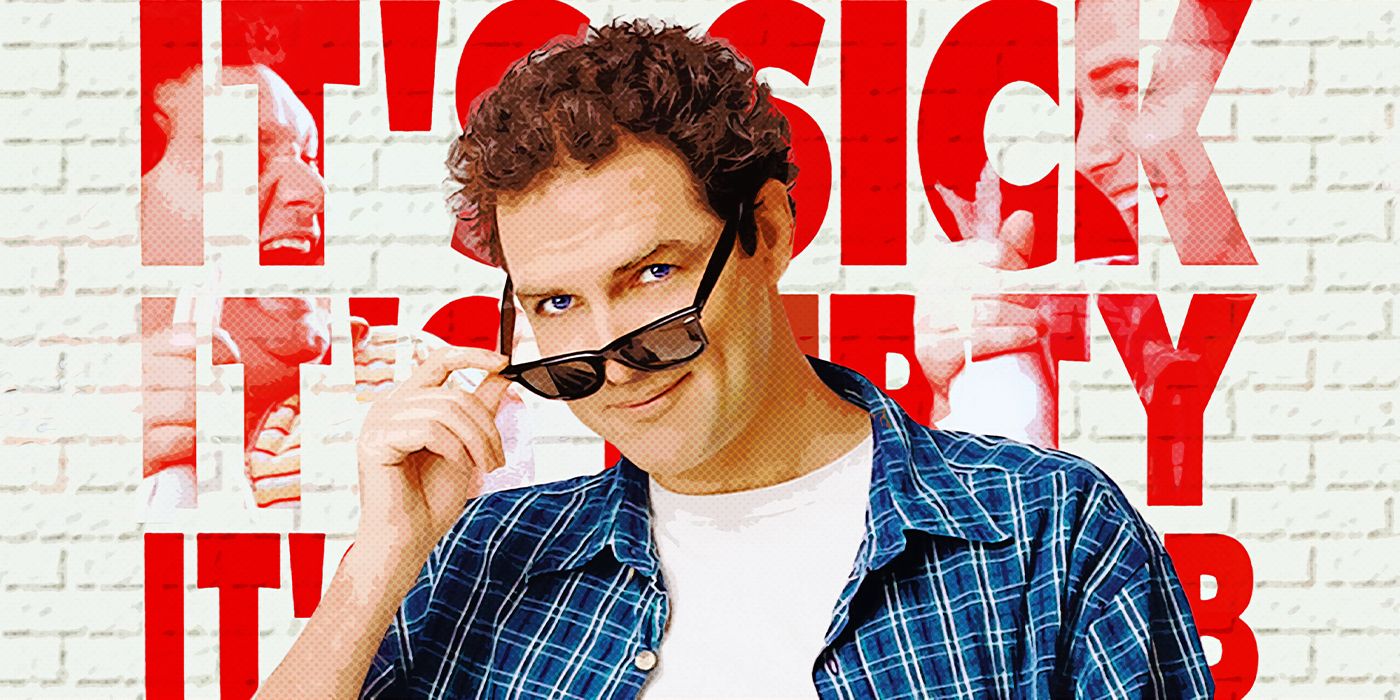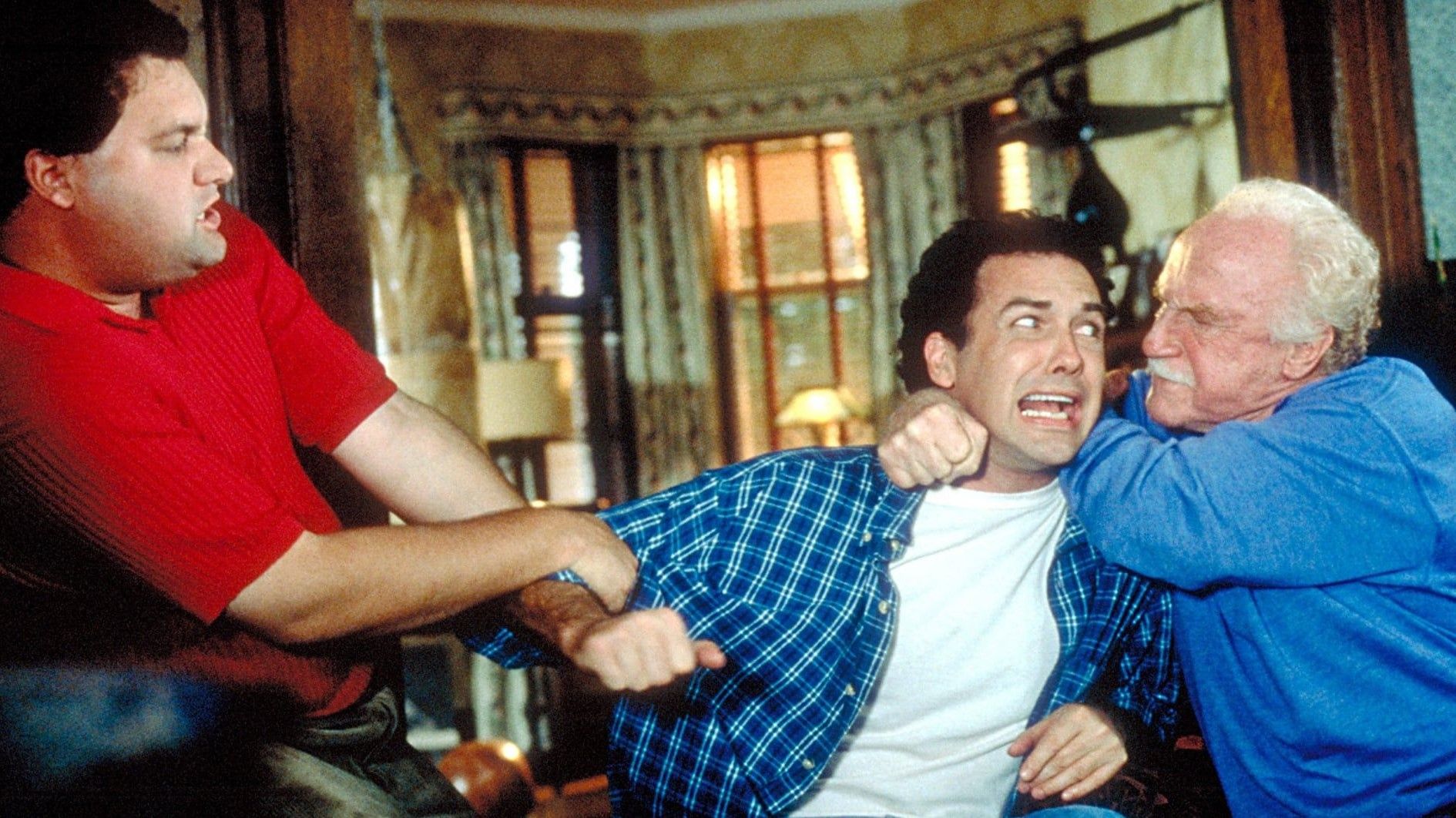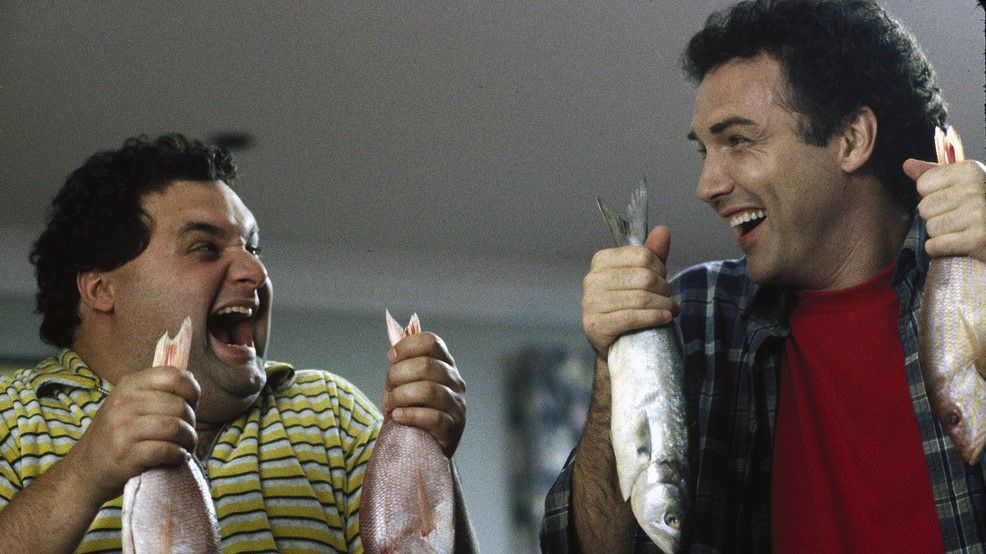There was no one like Norm Macdonald. There probably never will be again. The Quebec-born comic had a way about him: a singular manner, an almost laconic cool, and an enviable talent for unpacking everyday comedic conceits in ways that were both grounded and absurd. More than anything, Norm just made you laugh. Even today, less than a year after his death, and the comedy community is still reeling from his passing.
Norm was not what you’d call prolific in feature films, despite his status as a veteran of the comedy stage combined with his tenure at SNL, where he arguably still holds the title of best Weekend Update host to ever take the gig. Largely, Macdonald was content to handle voice gigs or small, sometimes uncredited parts in friend's movies. Occasionally, for instance, he would pop up in silly, blink-and-you'll-miss-them cameos in films headlined by his Saturday Night Live pals Adam Sandler and Rob Schneider.
Dirty Work is one of two studio films in which Macdonald was ever a bona fide comic lead, the other being 2000’s largely forgotten, not entirely unfunny blackmail comedy, Screwed. Dirty Work tells the story of Mitch Weaver: an underachiever who, at a young age, resolved to make it his life's mission to “never take crap” from anybody. As an adult, Mitch grimaces through a sad-sack existence as the petty grievances pile up around him. Everywhere he goes, he is reminded of his standing as a deadbeat: a born loser who will never amount to anything. The only constant presence in Mitch’s life is his inexplicably jolly best friend Sam (Artie Lange), whose career prospects are similarly dim.
Dirty Work is the story of what happens when Mitch and Sam decide to open a “revenge-for-hire” business that allows those who have been slighted to exact retribution on their tormentors. This leads to a lot of surprisingly dark, out-there gags that involve beating up frat boys, stuffing every nook and cranny of a mobster’s house with rotting fish carcasses, or barnstorming a production of the opera “Don Giovanni” alongside a small army of skunks. It’s a truly warped form of farce that Bob Saget’s cult comedy traffics in, but it’s one that nevertheless seems to perfectly embody Macdonald’s brilliantly off-kilter comedic sensibility.
On the basis of Dirty Work, we’d argue that Norm possessed what it takes to have a career headlining comedy features. Of course, one could feasibly argue that Macdonald lacks the big-heartedness of someone like Robin Williams and the disarming frat-boy affability of his buddy Adam Sandler, which is why he’s been so frequently demoted to amusing second banana roles. In Dirty Work, Macdonald capably steps into a Chevy Chase-style arrogant schmuck part with the ease and confidence of a born leading man (Chase, it must be mentioned, appears in amusing interludes throughout Dirty Work as a gambling-addicted surgeon whose brushes with shady bookies leave him increasingly bloodied and bruised).
Mitch is, in so many fewer words, a degenerate. Yet, we as the audience need to be able to like him in order for the movie to work at all. Macdonald, against all odds, manages to get us on Mitch’s side without glossing over his horrible qualities. This is one of a few reasons why the role isn’t played by someone like, say, Macdonald's other SNL pal, David Spade, who specializes in playing snide, sarcastic heels.
The prototype of Mitch Weaver can be interpreted as the embodiment of who Norm Macdonald could have been, if he had actually chosen to relentlessly pursue a career in lead vehicles. After all, Mitch — a dude by turns peeved and unflappable, a natural slacker who never seems more in his element than when he’s sozzled at a watering hole where the bartender is a disturbed weirdo (a hysterically funny Chris Farley, in what was sadly his final film role) whose nose was quite literally bitten off by a sex worker — is in every scene of the movie. Macdonald needs to be able to carry this whole thing on his shoulders. Lucky for us, the funny Canuck was up to the task, though Macdonald is ably assisted by Lange, as well as legendary character actor Jack Ward, who plays Sam’s sex-crazed, ill-tempered father, Pops.
Macdonald was never what you would call an "actor’s actor." He was not one to be known for disappearing into a character à la Jim Carrey, nor was he partial to the gross-out antics of someone like, say, Tom Green. Dirty Work, then, remains the ideal vehicle for Macdonald’s particular voice as a comic because the humor is actually relatively dry, at least by the standards of a comedy made in the late '90s, when raunch was all the rage. Saget’s movie is more content to be droll and absurd than merely vulgar for the sake of vulgarity, although it would be misleading to suggest that Dirty Work isn't also top-heavy with that particular quality.
A great deal happens to Mitch Weaver over the course of Dirty Work. He loses over a dozen jobs and starts his own small business, wages war against a property developer (screen scumbag extraordinaire Christopher McDonald) and hallucinates a car ride with the devil (a Sandler cameo that’s almost too strange to be believed) and Gary Coleman whilst under the influence of powerful weed brownies. Yet, in spite of all the suffering Mitch is forced to endure, the character's cynicism never boils over to rage. Mitch never loses his cool, and never once strays from the wry, unworried cadence that would go on to become Macdonald’s signature.
As a funnyman, Macdonald despised snobbery or elitism of any kind. This idea is crystallized in Dirty Work when Mitch and Sam hatch a last-minute, late-in-the-movie plan to stop a royal opera house from being built where a low-cost apartment building once stood. If our heroes fail, the building's tenants — many of whom are decent, working-class people who have lived there for years — will lose their homes. In the end, we end up liking Mitch not only because Macdonald plays him with a kind of ruffled, shaggy-dog guilelessness, but because he’s clearly, in spite of his flaws, trying to be on the right side of things. In the end, he stands up for the little guy, even if his methods of doing so are depraved. In so many ways, Dirty Work simply doesn’t exist without Norm Macdonald. The movie’s success is quite literally impossible to imagine without him at its center.
While Dirty Work has enjoyed no shortage of cult success since its release in 1998, the movie didn’t exactly set records at the box office. Macdonald’s next film, Screwed, unfortunately suffered a similar fate, and received similarly scathing reviews from critics. Thus, Macdonald retreated from the spotlight, turning up in the Eddie Murphy-starring Dr. Doolittle films, taking small parts on shows like Family Guy and My Name Is Earl, and playing characters with bizarre names like Geezer and Funbucket in late-career Sandler movies like Grown Ups and Jack And Jill. We’ll miss Norm and all the comedy gold he left us with, but there’s no denying that there is no better vehicle for the guy’s one-of-a-kind worldview than Dirty Work. It’s the uproarious dirtball salvo that just keeps on giving, year after year.



